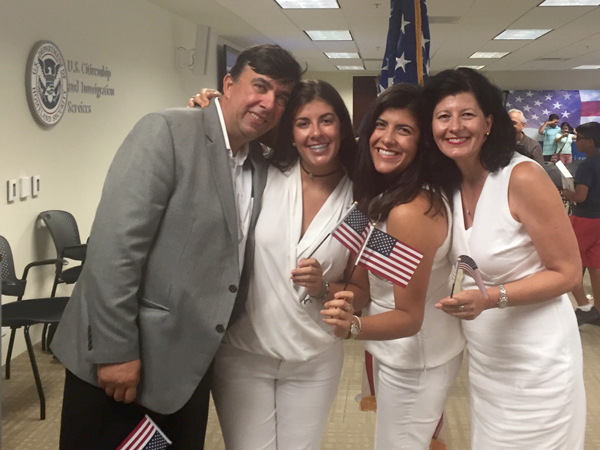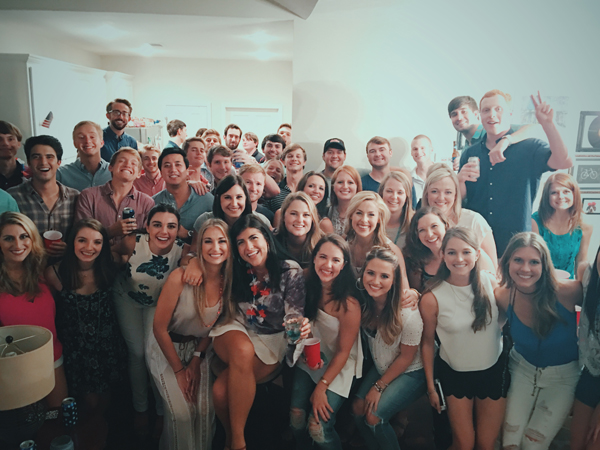Medical student makes pledge to new profession, new country
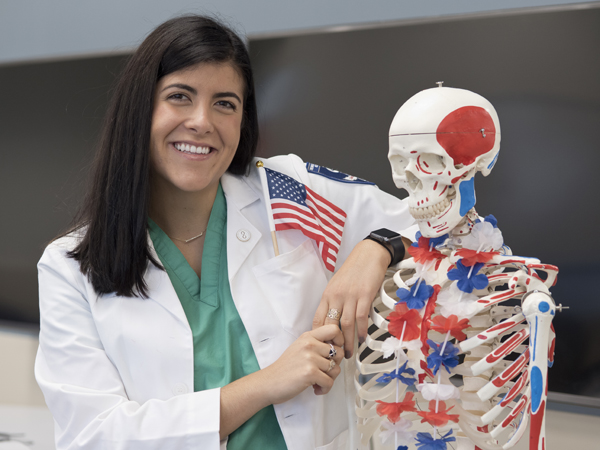
Published in News Stories on October 20, 2016
Two days before Independence Day 2002, Sara Kiparizoska and her family moved from their native country of Macedonia and landed in the United States.
They took their first collective breath of American air on a sultry, scorching day in Mississippi - and nearly suffocated; but they've been breathing easier ever since.
Within months of starting school, Sara could speak English about as well as any 9-year-old, and over the next 14 years, she acquired a Southern accent, graduated from West Jones High School in Laurel, secured a scholarship to the University of Mississippi, enrolled in the school's Honors College, signed on as a lifestyles writer for The Daily Mississippian, took on the role of campus leader, joined a sorority, co-founded a business app, earned her bachelor's degree in biochemistry and won admission to medical school.
And in August she, along with her mother, father and sister, finally attained what she considers one of her most prestigious awards: U.S. citizenship.
“It was a family decision,” said Kiparizoska, 23, a first-year medical student. “It's something we're proud of, to officially become a part of a place that we've loved for so long.”
Sara Kiparizoska, second from right, congratulates her parents, Zan Kiparizoski and Gordana Kiparizoska and sister Eva Kiparizoska immediately after their naturalization ceremony in New Orleans.
It's rarely safe to say that something or someone is the “first-ever;” it's not known if Sara Kiparizoska is the first student here to become naturalized while in medical school. But it's highly likely she's the first from the landlocked Balkan nation distinguished by its scenery, ancient history, and as the substance of one of St. Paul's visions.
“Actually, I think we're the only Macedonians around - American-Macedonians, that is,” said Kiparizoska, 23. “A lot of people aren't familiar with the country; you'd be surprised how many times I get 'Madagascar?'”
About 4,500 miles northwest of Madagascar, she lived the first third of her life in the medieval townscape of Ohrid, called “the Jerusalem of the Balkans” for its plentiful churches. A Macedonian resort city inhabited by cypress and pine, a hilltop castle and red-tiled roofs, it overlooks a massive, blue-green lake.
“Eastern Europe is beautiful,” Kiparizoska said.
All of her other relatives remain in Europe, including an aunt who's an anesthesiologist in Macedonia, a country of two million, and two cousins who are physicians in Germany.
Her father is Zan, whose last name is Kiparizoski - the Macedonian language differentiates male and female names with a concluding “i” and “a,” respectively. Her mother is Gordana Kiparizoska. Sara's sister, Eva, 15, was only 1½ when the family moved to the United States, and is now “the typical Southern girl,” their mother said.
Considering that their goal was to work in an “international setting,” as he put it, their choice to immigrate was an easy one for Zan, an electrical engineer, and Gordana, an electrical engineer in computer science, especially when they found jobs at Howard Industries in Laurel, a global titan among transformer manufacturers.
Added bonus: “We always wanted to move to the United States,” Gordana said.
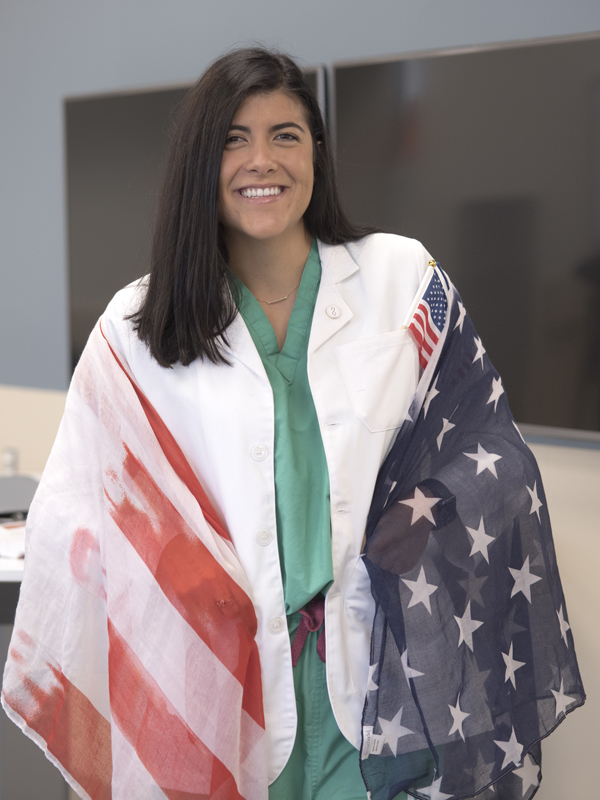
Among Sara's possessions that symbolize her newly adopted country is this scarf with a U.S. flag theme
But Zan's interview in Laurel followed by a few days the 9/11 terrorist attacks. “I thought he should delay it, but he said, 'I'm going,'” Gordana recalled.
About eight months later, the entire family came to America for good. Stepping off the plane in Gulfport, Gordana was roasted in the Mississippi heat.
“That was the hottest day of my life,” she said. “My biggest adjustment here has been the humidity. But it was a very good decision that we made. Sara was the most excited child on the planet.”
Soon, though, Sara faced adjustments of her own, and they had nothing to do with the heat.
“At first, she had a big smile every day coming home from school,” Gordana said. “After a couple of weeks, she was crying. She said it was so difficult to catch the Southern accent.”
Sara entered the third grade knowing the English words for “cat” and “dog,” her numbers, colors and little else.
“I remember making F's on all the tests, except math,” she said. To help her with her new language, her parents hired a tutor, who also taught English to Spanish-speaking children. “Some things were lost in translation,” she said.
Dora the Explorer and SpongeBob SquarePants filled in the cracks. Thanks to American TV, her tutor and her parents' diligent help with her homework, Sara could, within three months, speak English “fluently,” her mom said.
From then on, she talked and studied her way into a world of scholastic excellence and, a few years ago, opened her acceptance letter from Ole Miss.
“I had visited the campus and was automatically hooked,” she said. “As cheesy as it sounds, it's impossible to have a rainy day in Oxford.”
Kathryn Wegener of Jackson might argue that the friend she, and everyone else, calls “Kip,” helped brighten up the campus herself.
“She's brilliant and one of the most spontaneous people I know,” said Wegener, also an M1, who met Sara at Ole Miss.
“Last year, she and a friend spontaneously decided to buy plane tickets to Chicago the week before exams; they went to a Bulls game and everything. And somehow she still managed to get a 4.0.”
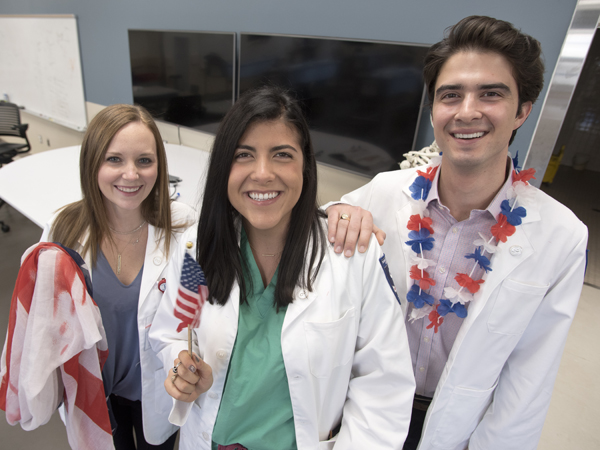
Among those who have celebrated Sara's U.S. citizenship are her friends and fellow M1s Kathryn Wegener, left, of Jackson and John Bobo of Clarksdale.
Although she no longer has her hands in it, Sara whipped up the basic idea for Curtsy, which turned into a mobile phone app that enables college students to rent formal wear to and from their peers, a business now run by two former University students, the brother-sister team of William and Clara Agnes Ault.
Business smarts aside, Sara has wanted to be a physician since high school, and is considering a residency in OB-GYN. “What's better than delivering babies?” she said.
Fellow medical student John Bobo of Clarksdale got a glimpse of her future during a clinical skills workshop that required role play.
“Everyone in our group, including the professor, was impressed by her performance,” said Bobo, president of the M1 class. “She's a natural, and I know she is going to be an incredible physician.
“Working with her on the student council, I know what a hard worker she is. She is our class liaison, which means she negotiates with professors to put points back in our classmates' pockets after each test. She does a lot behind the scenes to help our class. Everyone knows her as a kind spirit.”
Her classmates have repaid her kindness, celebrating the newly-minted American on a couple of occasions, including in the classroom. “I walked in and the national anthem was playing,” Sara said.
“There were balloons and candy. It was the nicest gesture.”
Friends and members of the first-year medical school class toast Sara, front row, second from left, after she obtained her U.S. citizenship.
But it took more than a dozen years to realize the goal of citizenship. “It's a process,” Zan said. “If we could have done it earlier, we would have done it. We love it here.
“It's as simple as this: When people say, 'Are you planning to go back home?' I say, 'I am home.'”
Because Sara was considered a resident of Oxford at the time, she was assigned to take her oath of citizenship at the nearest available location, the Natchez Trace Parkway Visitors Center in Tupelo, on August 25, the 100th birthday of the National Park Service.
She was among 14 different people, representing 11 countries, who accepted the obligations of a U.S. citizen.
“There's a symbolism during the ceremony that can't be described,” she said. “It just reinforced what we had been feeling all along. It's less a ceremony, and more of a celebration.”
As Laurel residents, Sara's parents and sister were assigned to the U.S. Citizenship and Immigration Services field office in New Orleans, more three weeks earlier, on August 1.
Gordana was chosen to lead the pledge of allegiance. “It was totally random,” said Sara, who was there. “I guess they saw this sweet lady - and said, 'She's the one.'”
Afterward, the family and several close friends lunched at a French Quarter restaurant. “When the people in charge heard what we were celebrating, they kept bringing us all these desserts,” Sara said.
“People are happy when you want to be a part of what they love, a part of this great country; that just makes it even better.”

Tupelo TV station WTVA covered Sara Kiparizoska's naturalization ceremony, August 25; to watch the video, go to http://www.wtva.com/news/The_National_Park_Service_has_a_naturalization_ceremony_on_its_100th_birthday.html.
Photos
 | <?xml version="1.0" encoding="utf-16"?> <PublicationArticles> <Article>2147553104</Article> <Article>2147553090</Article> <Article>2147553097</Article> <Article>2147553049</Article> <Article>2147553050</Article> High Resolution Medium Resolution Low Resolution |
 | High Resolution Medium Resolution Low Resolution |
 | High Resolution Medium Resolution Low Resolution |
 | Graduates 2016a.jpg High Resolution Medium Resolution Low Resolution |
 | High Resolution Medium Resolution Low Resolution |



